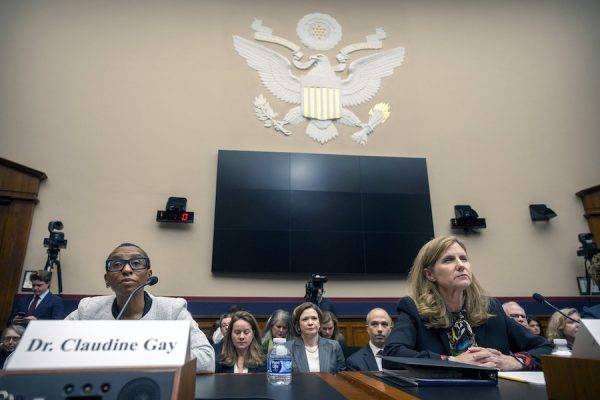
Since acknowledging the contamination of Flint’s water supply, Michigan has provided residents with bottled water. Accountability for the crisis has proven harder to come by. / Michigan State Police
What is unfolding in Flint, Michigan, is not just a public health crisis. Faith in the public sector, too, is at risk of being irreparably shaken.
Lead-contaminated water has flowed since the spring of 2014 into this city of roughly 100,000 people, despite residents’ repeated complaints. Several investigations and class-action lawsuits are underway, highlighting the contempt in which the people of Flint were held by the very state officials tasked with protecting their safety. Governor Rick Snyder has apologized and promised support not just to fix Flint’s corroded pipes, but also to expand special education and mental health services.
Snyder also pledged accountability for the decisions that led to the poisoning of Flint’s tap water. That includes the release of his 2014 and 2015 emails relating to the crisis. “Most of all, you deserve to know the truth and I have a responsibility to tell you the truth,” Snyder said in his recent State of the State address. Nearly 300 pages of emails are now freely available online.
In Michigan, the legislature, governor, supreme court, attorney general, and secretary of state are all exempt from public records requests.
That is an important step in rebuilding public faith in government. But secrecy runs deep in Michigan. The lack of transparency that characterized the official handling of the water crisis—itself a product of bungled choices by a series of technocratic state managers unbeholden to voters—is pervasive in in the state, as a matter of law.
Michigan is the rare state where both the legislature and the governor’s office are exempt from public records requests. The Michigan Supreme Court, the attorney general’s office, and the secretary of state’s office are also exempt. There are additional FOIA exemptions for information about trade secrets, security, medical records, and attorney-client privilege; a new bill seeks further exemptions for energy infrastructure and cyber-security. In Michigan, no independent entity monitors the use of open access laws to ensure that they are fair and effective. While the law requires a response time of five to fifteen business days for FOIA requests, in practice, a one-to-three month wait is not uncommon.
So it is no surprise that Michigan ranks dead last in the most recent State Integrity Report Card from the Center for Public Integrity, which was issued about a month after the state was forced to admit the legitimacy of water concerns in Flint. And the usual public watchdogs—local journalists—have struggled to do their jobs in the face of steep cuts. There are fewer feet on the street after significant buyouts late last year at the Detroit Free Press and the Detroit News, the state’s largest news outlets, and only a handful of reporters work at the Flint Journal these days. (It, too, was hit with cuts recently.) Lindsey Smith, Michigan Radio’s lead reporter on the water story, did excellent work—even though she is based in Grand Rapids, on the other side of the state.
Still, it doesn’t help that FOIA requests by reporters come with hefty price tags, sometimes in the thousands of dollars. In Flint, many of the illuminating FOIA requests made to the Michigan Department of Environmental Quality were issued not by news organizations but by a Virginia Tech engineering professor, Marc Edwards, who was studying lead levels in the town’s water. Those requests cost $3,180 to date, and Edwards paid for them out of pocket.
Meanwhile, Snyder is still making controversial use of state-appointed emergency managers, who are now in charge of distressed school districts in Detroit, Highland Park, and Muskegon Heights. When the city of Lincoln Park exited emergency management in December, it marked the first time in fifteen years that Michigan was without a city run by a state appointee. Such are Flint’s financial problems that it has been in receivership off and on since 2002. Its emergency managers could, and did, supersede the wishes of the city’s own elected officials. That included overruling the city council which, alarmed by the diminished water quality after the switch, voted in March 2015 to “do all things necessary” to reconnect to a safe water source. The then-manager called the city council’s vote “incomprehensible.” Because no one votes for emergency managers, they have little incentive to share the reasoning behind their decisions.
Snyder’s actions to date have done little to peel back the layers of secrecy. As revealing as the release of his emails from 2015 and 2014 has been, it is striking that he did not also release messages from 2013—the year when the emergency manager changed Flint’s water source. While Flint elected officials supported the move to a new independent water system, there is no indication that they were in favor of using untreated river water as a short-term source. That nuance has been muddled in statements from both the governor and the then-emergency manager, seemingly to sidestep culpability. The 2013 emails would clarify who was responsible for the fateful decision.
Although one might expect conservative leaders to back Snyder, they have joined liberals in demanding transparency from among elected officials. Currently openness is an at-will gesture for which Michigan residents and newspaper editorial boards must plead. Consider that a newly issued subpoena seeks access the 2013 emails and more: in most of the country, bringing this information to light is ordinary business; in Michigan, extraordinary measures must be taken.
The emergency management system that the state imposes on beleagured cities is also overdue for transparency reform. The law allows managers autocratic control to rebalance the books. But that comes at a cost to civic involvement. While the governor has boasted about Detroit’s genuine success in navigating municipal bankruptcy while in state receivership, the grave mistakes in Flint raise questions about the system’s oversight. In his State of the State address, Snyder mentioned emergency management only once, and did not call for reform. He apparently does not see in the water crisis a compelling rationale for increased accountability among emergency managers. It is telling that even as the state has made a massive effort to distribute water and filters in Flint, citizen activists have continued independent initiatives to provide each other safe water. People simply don’t trust a system in which accountability is so hard to come by.
As it stands, the Flint crisis did not even cause a speed bump in the career of Darnell Earley, the emergency manager who presided over the ill-fated water switch. He is now the emergency manager of Detroit Public Schools. This month, the schools have seen a massive wave of “sick-outs” to protest unsafe physical conditions, resulting in dozens of closures affecting tens of thousands of people. It is a serious interruption in instruction time—not to mention school-provided meals—for students. But after years under emergency management, with the democratic system suspended indefinitely, how else are teachers and staff to be heard?
While Snyder campaigned—and twice won election—by championing his competence as a businessman, in the end, Michigan is not a business. It is—or at least it is supposed to be—a democracy. Businesses strive for every efficiency, but we have decided as a society that transparency, accountability, checks-and-balances, and the equitable participation of all citizens are worth the inefficiencies they can cause. As the Flint crisis demonstrates, it is simply not good enough for state officials to say, “Trust us.”








